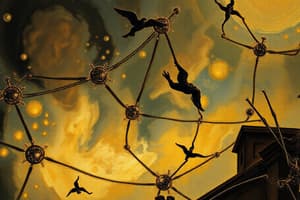Podcast
Questions and Answers
What is an ionic compound?
What is an ionic compound?
A compound that consists of positive and negative ions.
What happens when ionic compounds form?
What happens when ionic compounds form?
The ions come together in a way that balances out the charges on the ions.
How are ionic compounds named?
How are ionic compounds named?
The name of the positive ion comes first, followed by the name of the negative ion.
What are the main properties of ionic compounds?
What are the main properties of ionic compounds?
In an ionic compound, what does it attract to?
In an ionic compound, what does it attract to?
What is the pattern formed by the ions in an ionic compound?
What is the pattern formed by the ions in an ionic compound?
What happens when you heat an ionic compound such as table salt?
What happens when you heat an ionic compound such as table salt?
What are ionic compounds' melting points?
What are ionic compounds' melting points?
Do ionic compounds conduct electricity in solid form?
Do ionic compounds conduct electricity in solid form?
Flashcards are hidden until you start studying
Study Notes
Ionic Compounds Overview
- Ionic compounds consist of positive and negative ions combined through ionic bonds.
- These compounds are typically formed when ions come together to achieve a balanced charge.
Formation of Ionic Compounds
- Ions arrange themselves to balance their opposing charges, resulting in a specific chemical formula that reflects this charge neutrality.
Naming Ionic Compounds
- The naming convention for ionic compounds places the positive ion first, followed by the negative ion.
Properties of Ionic Compounds
- Ionic compounds are characterized as hard and brittle crystalline structures.
- They exhibit high melting points due to strong ionic bonds.
- When dissolved in water or melted, ionic compounds can conduct electricity due to the mobility of ions.
Ionic Attraction in Compounds
- Each ion in an ionic compound is surrounded and attracted to ions of opposite charge, forming a stable lattice structure that extends in all directions.
Crystal Patterns
- The ionic crystal pattern remains uniform regardless of the size of the crystal, meaning a single grain can contain millions of ions arranged in a consistent three-dimensional structure.
Effect of Heating on Ionic Compounds
- Heating an ionic compound provides energy, allowing ions to break free from their attractive forces, resulting in melting from solid to liquid.
- For example, table salt melts at 801 degrees Celsius.
Melting Points of Ionic Compounds
- The strength of ionic bonds requires a significant amount of energy to break, leading to high melting points for these compounds.
Conductivity of Ionic Compounds
- Solid ionic compounds do not conduct electricity as the ions are fixed in place within the crystal lattice and cannot move freely, preventing current flow.
Studying That Suits You
Use AI to generate personalized quizzes and flashcards to suit your learning preferences.




